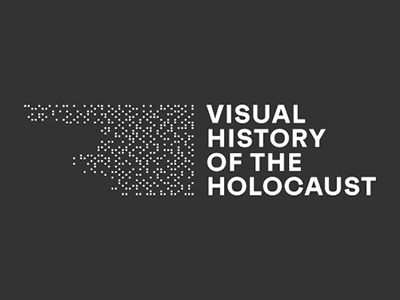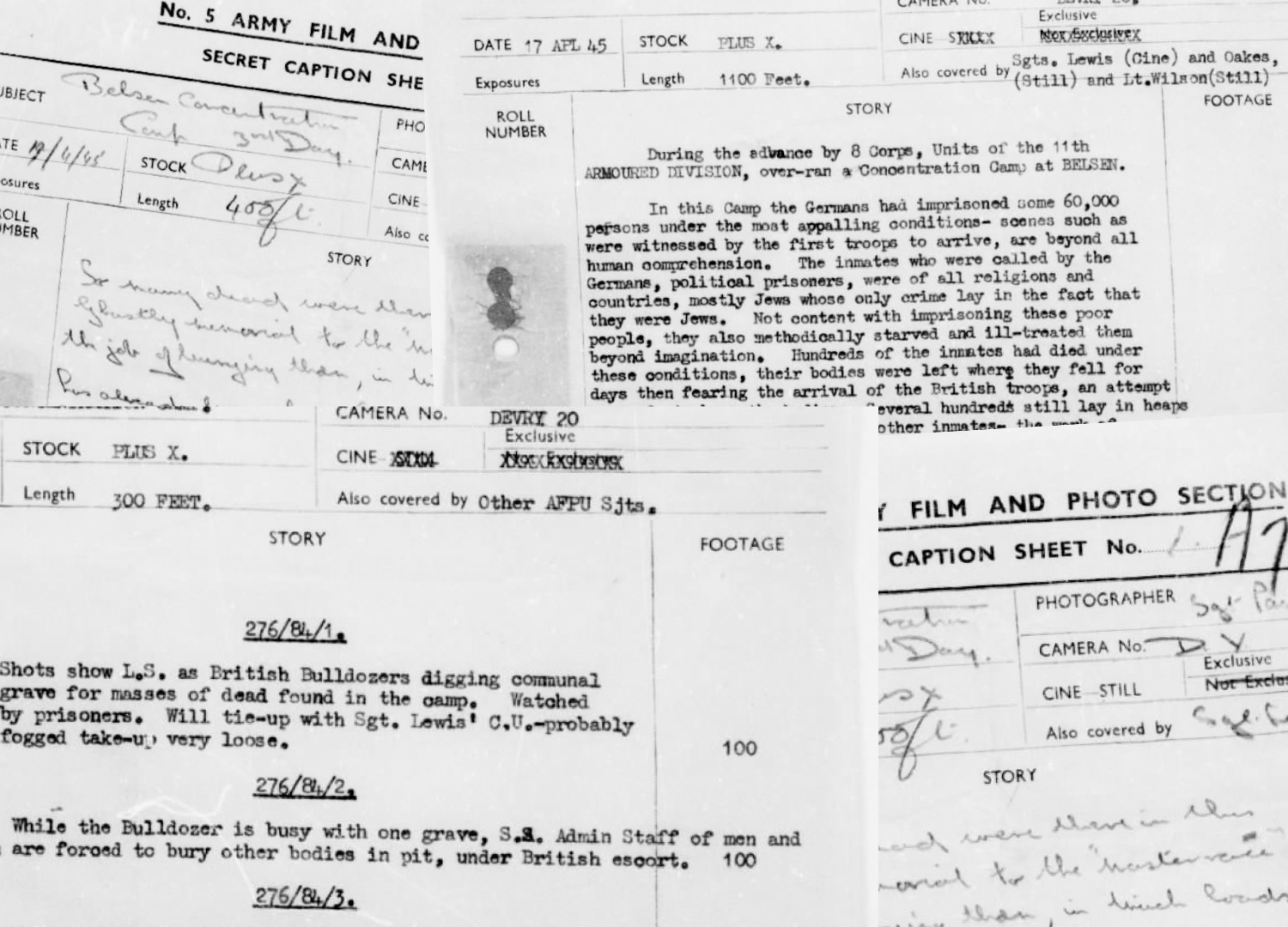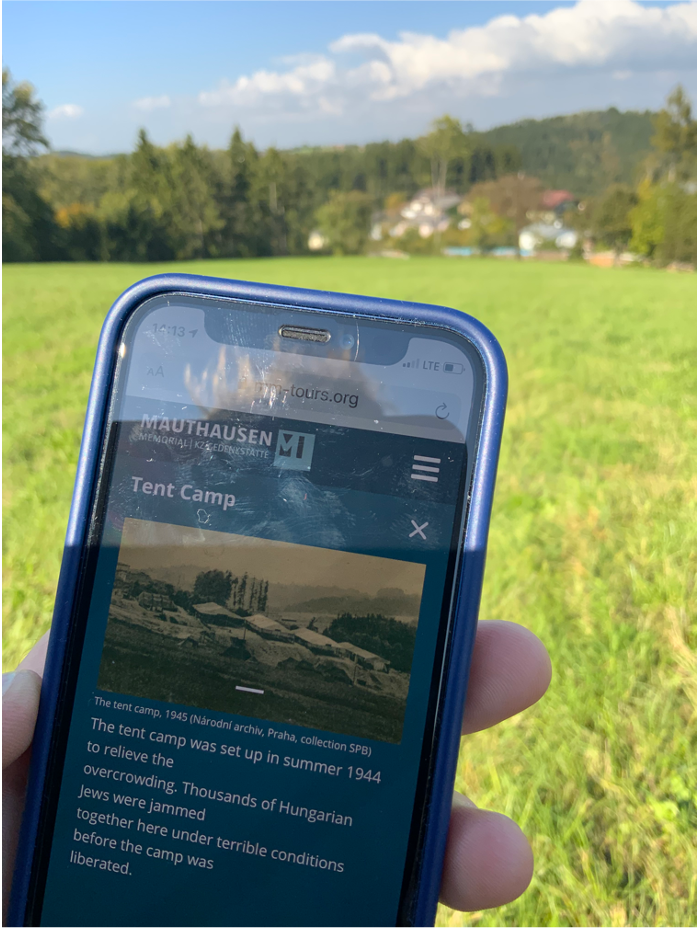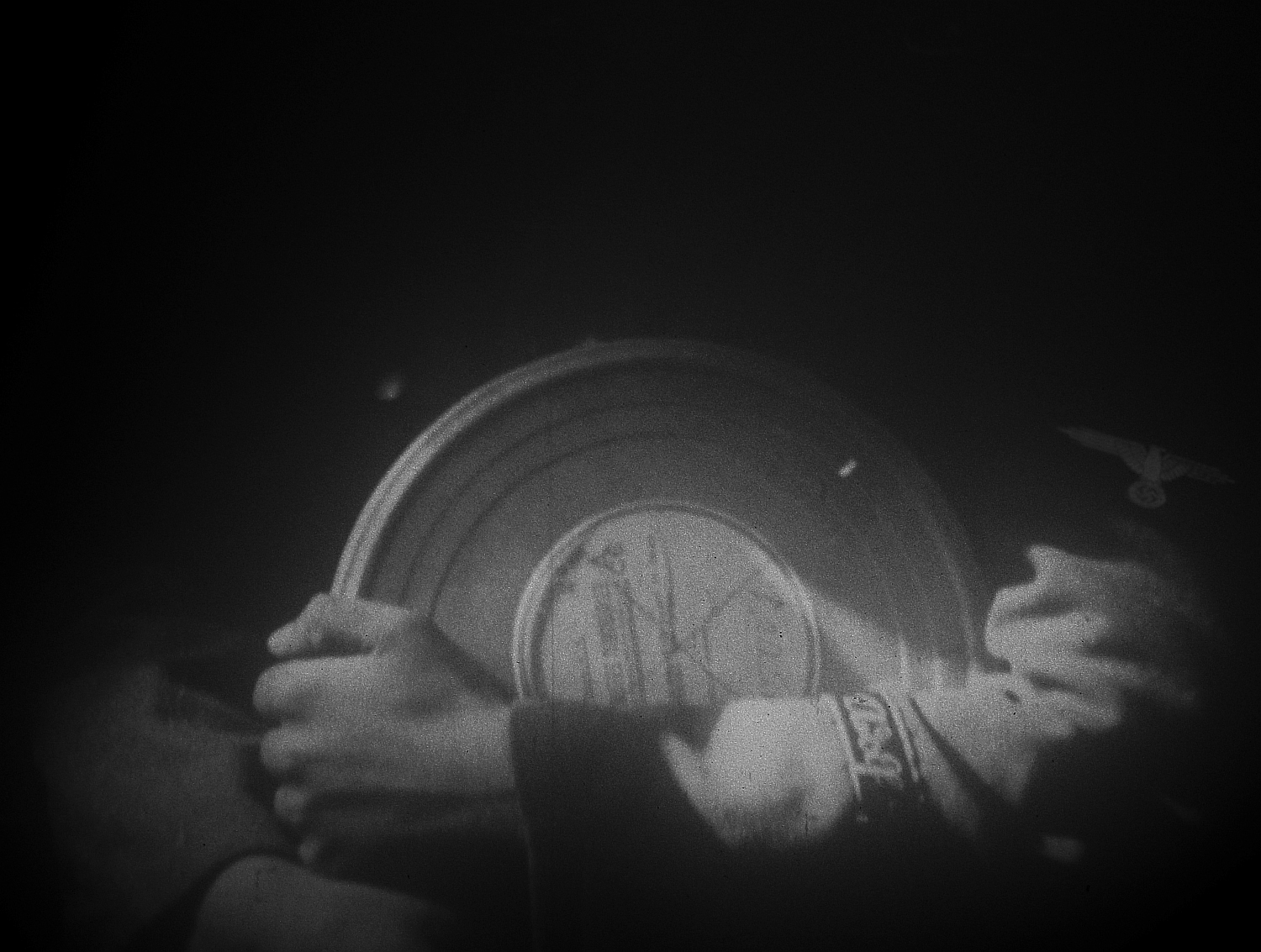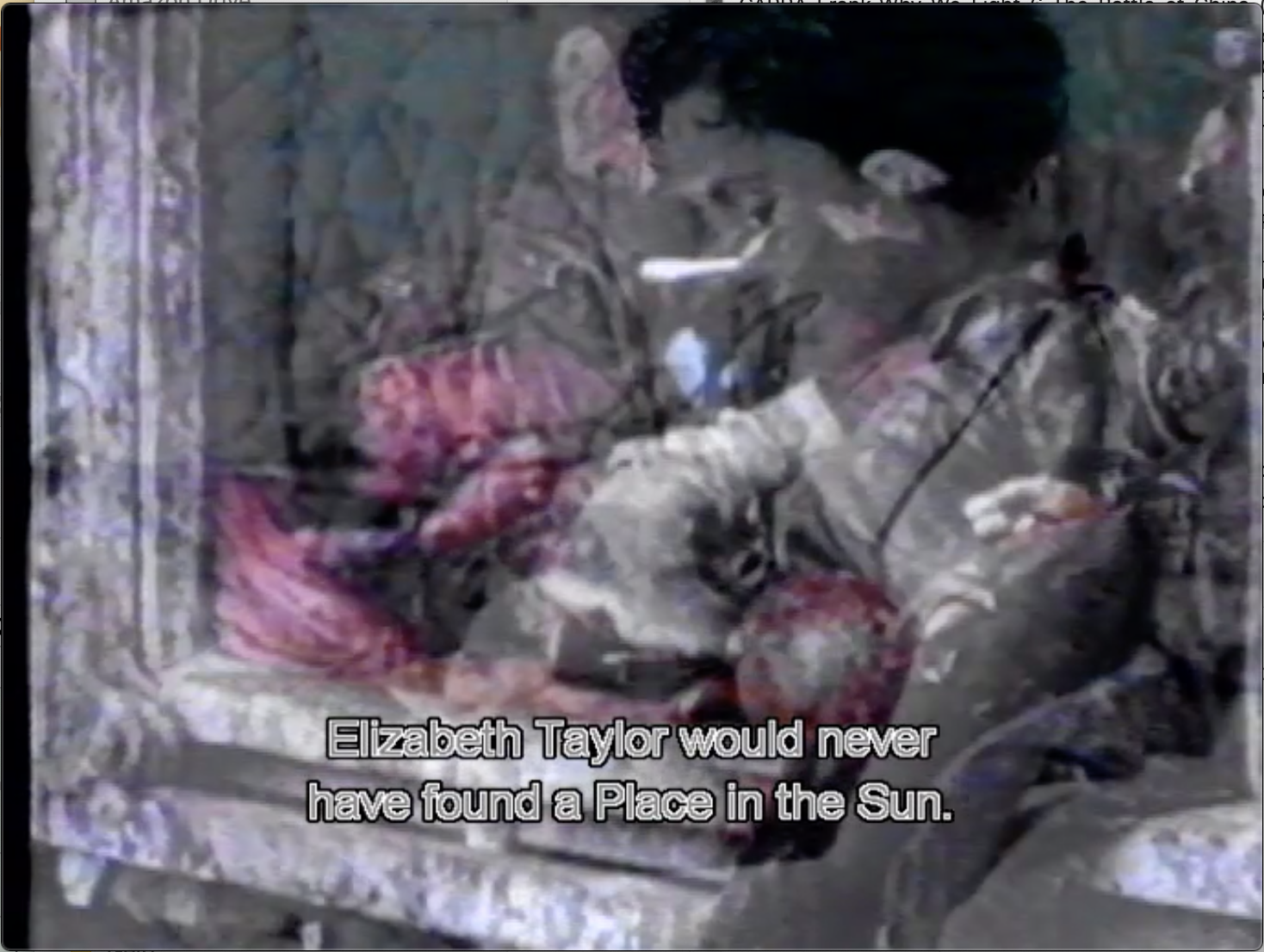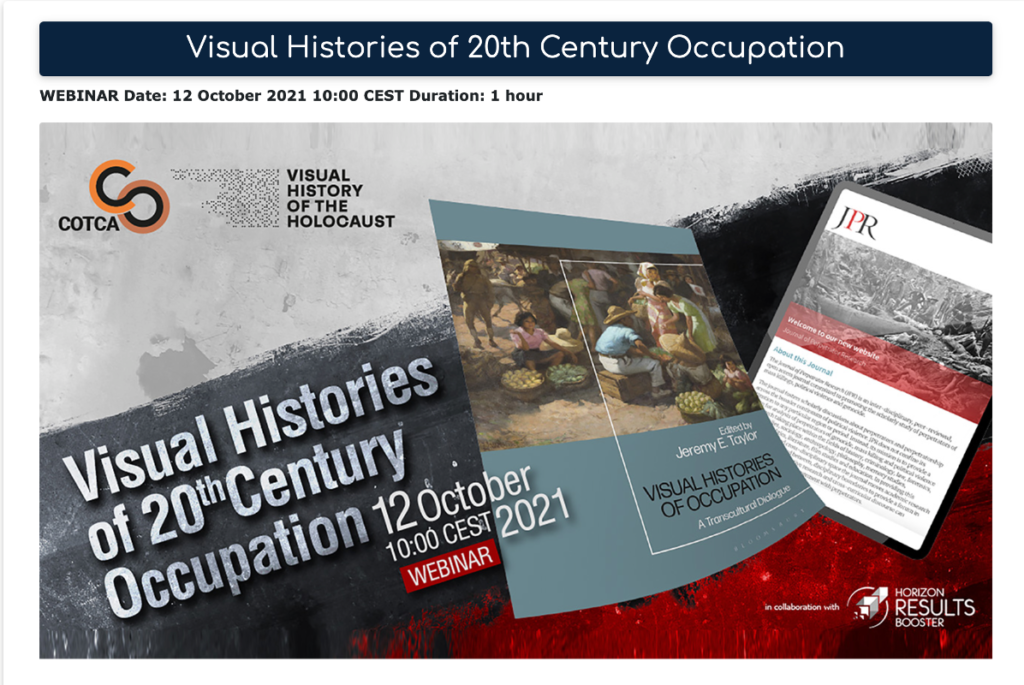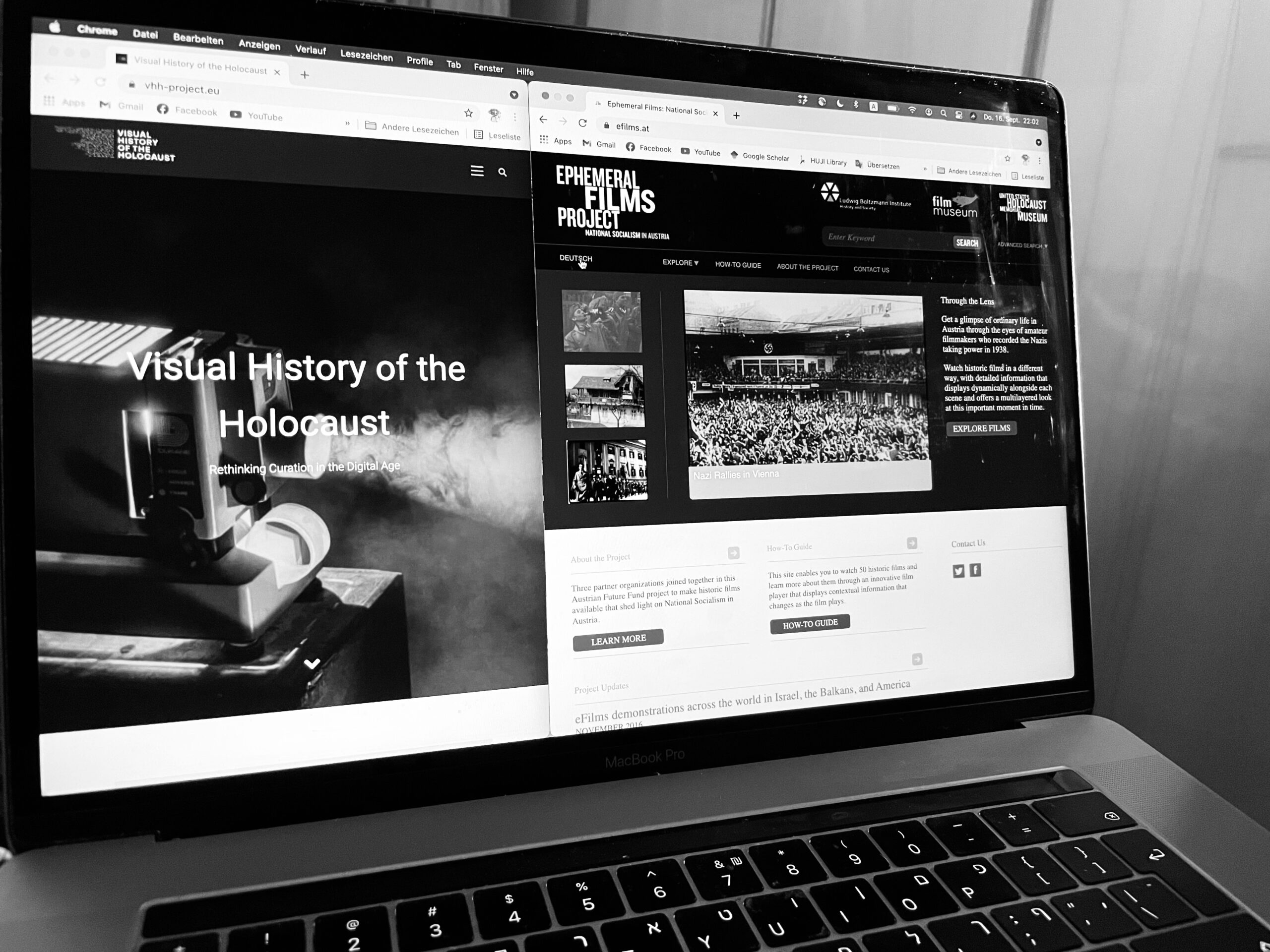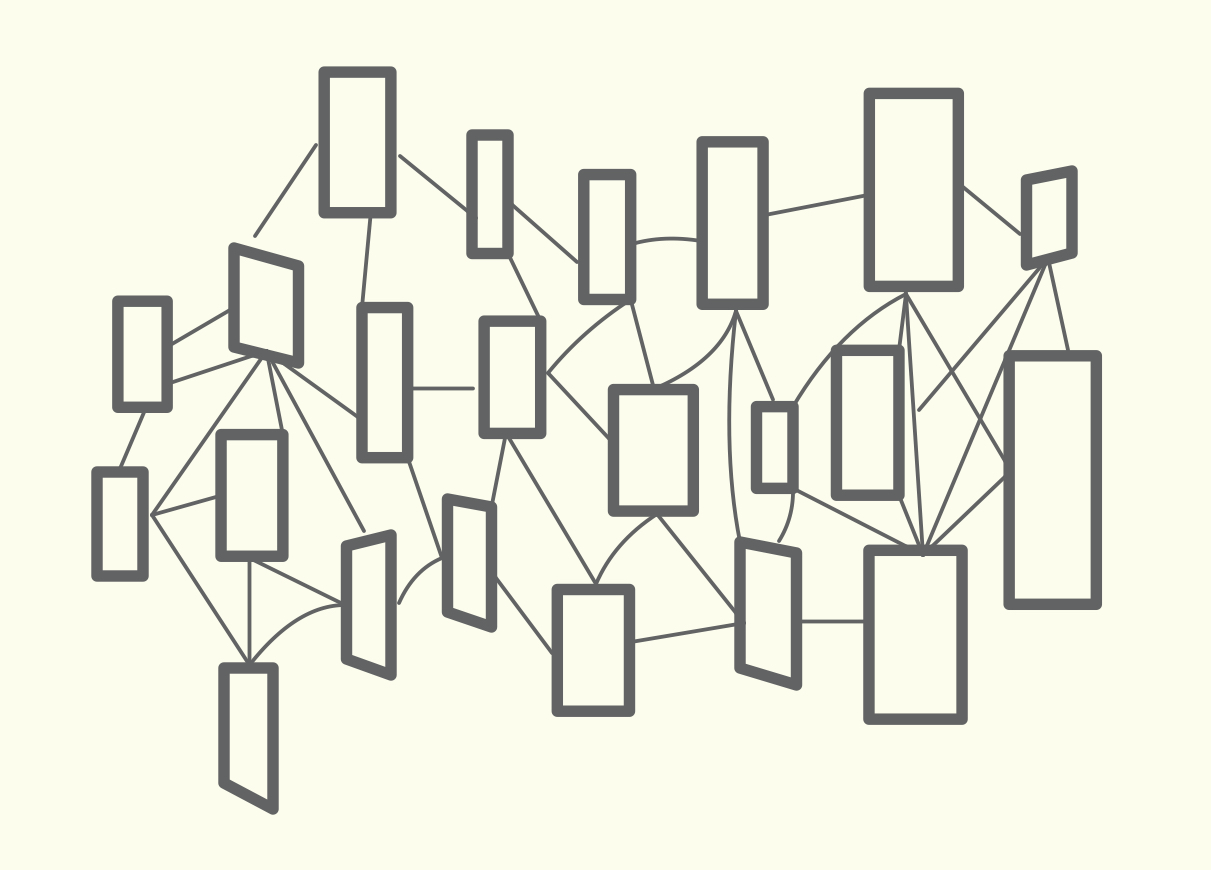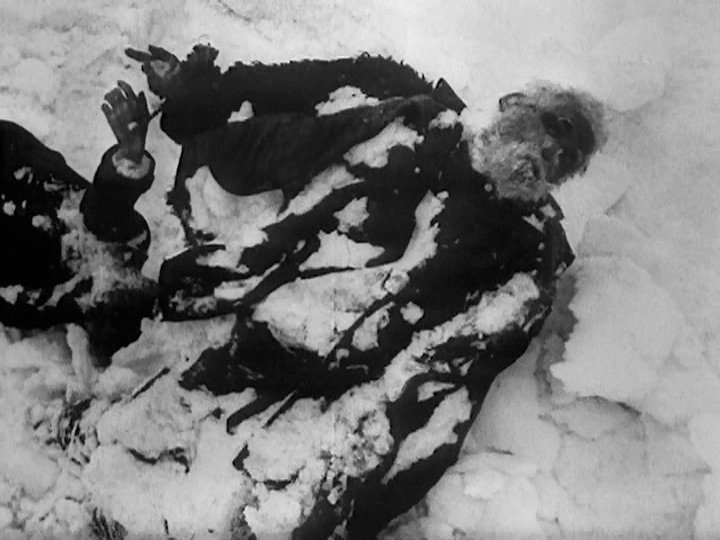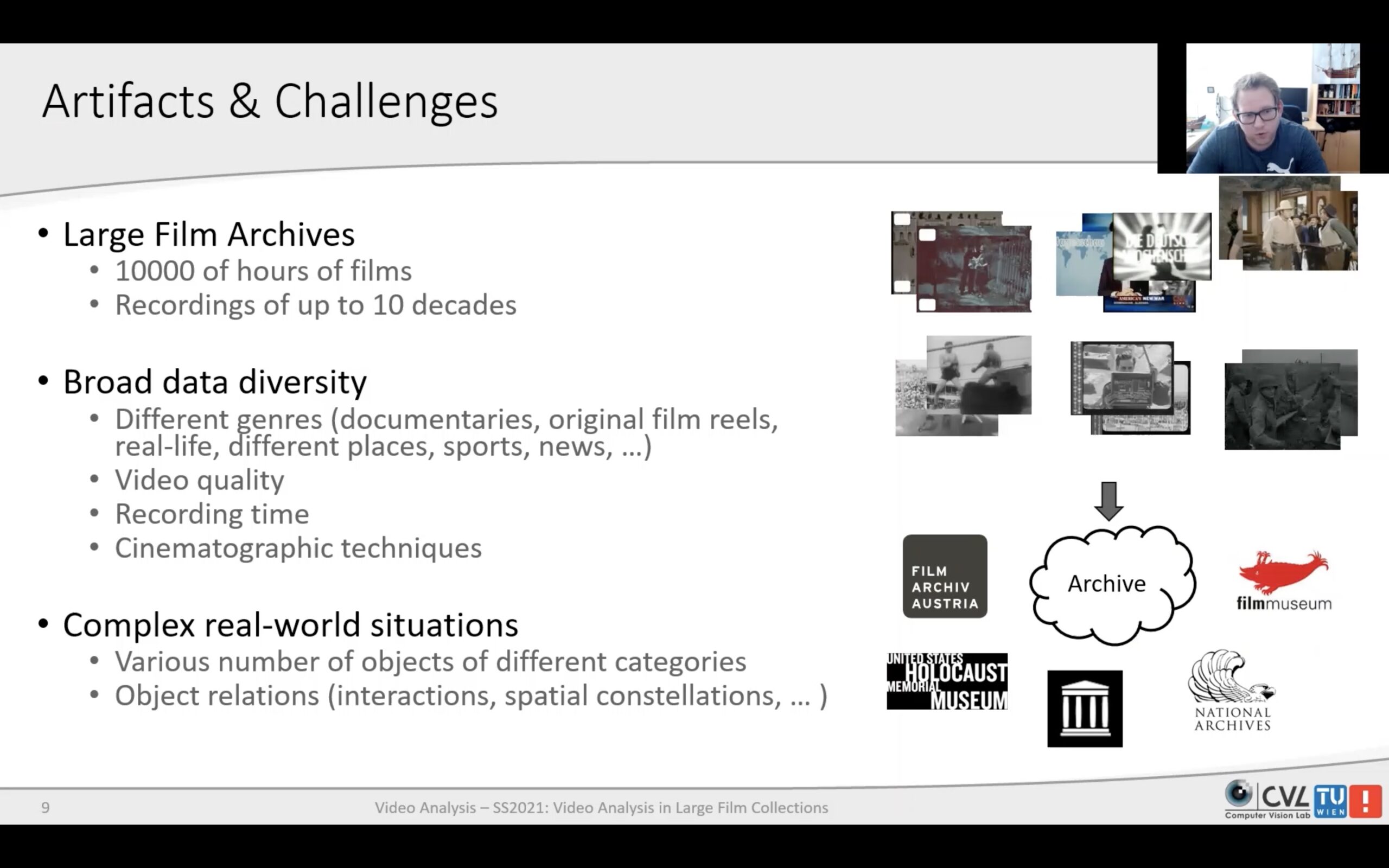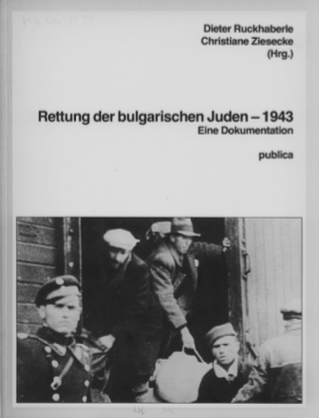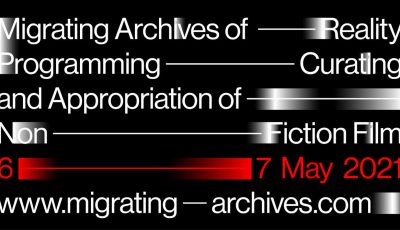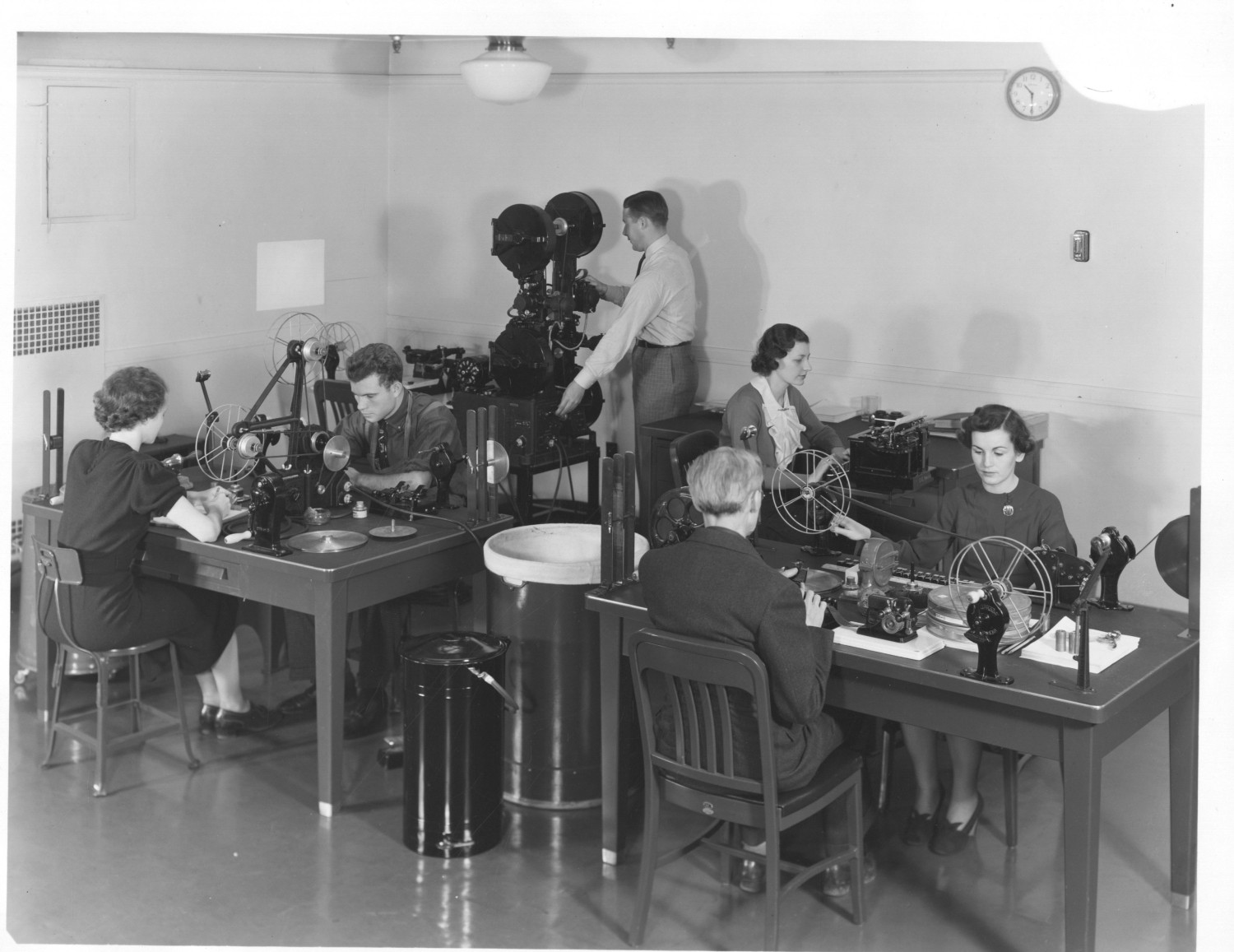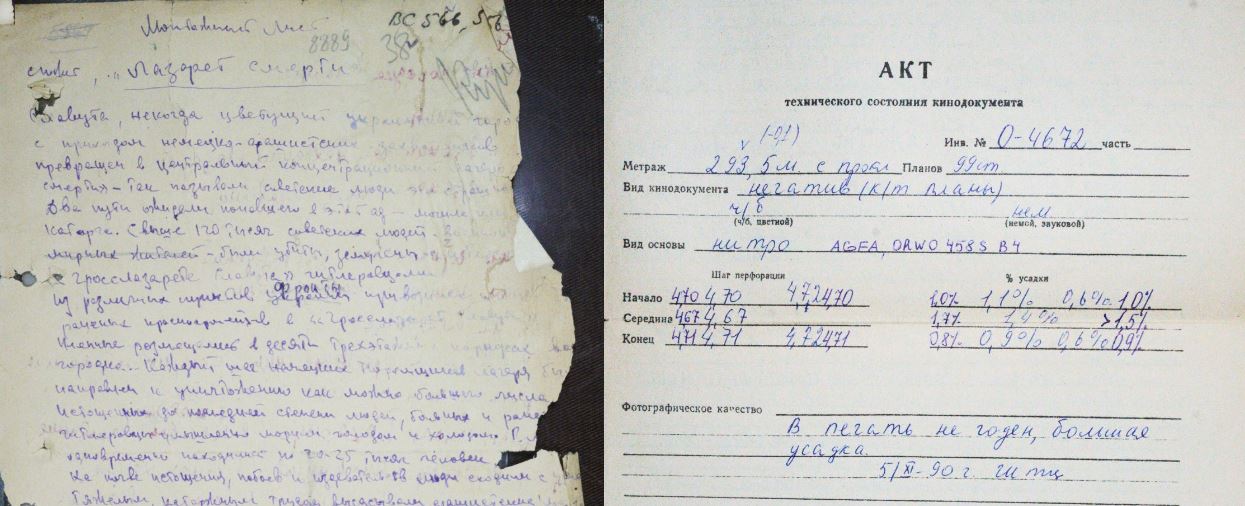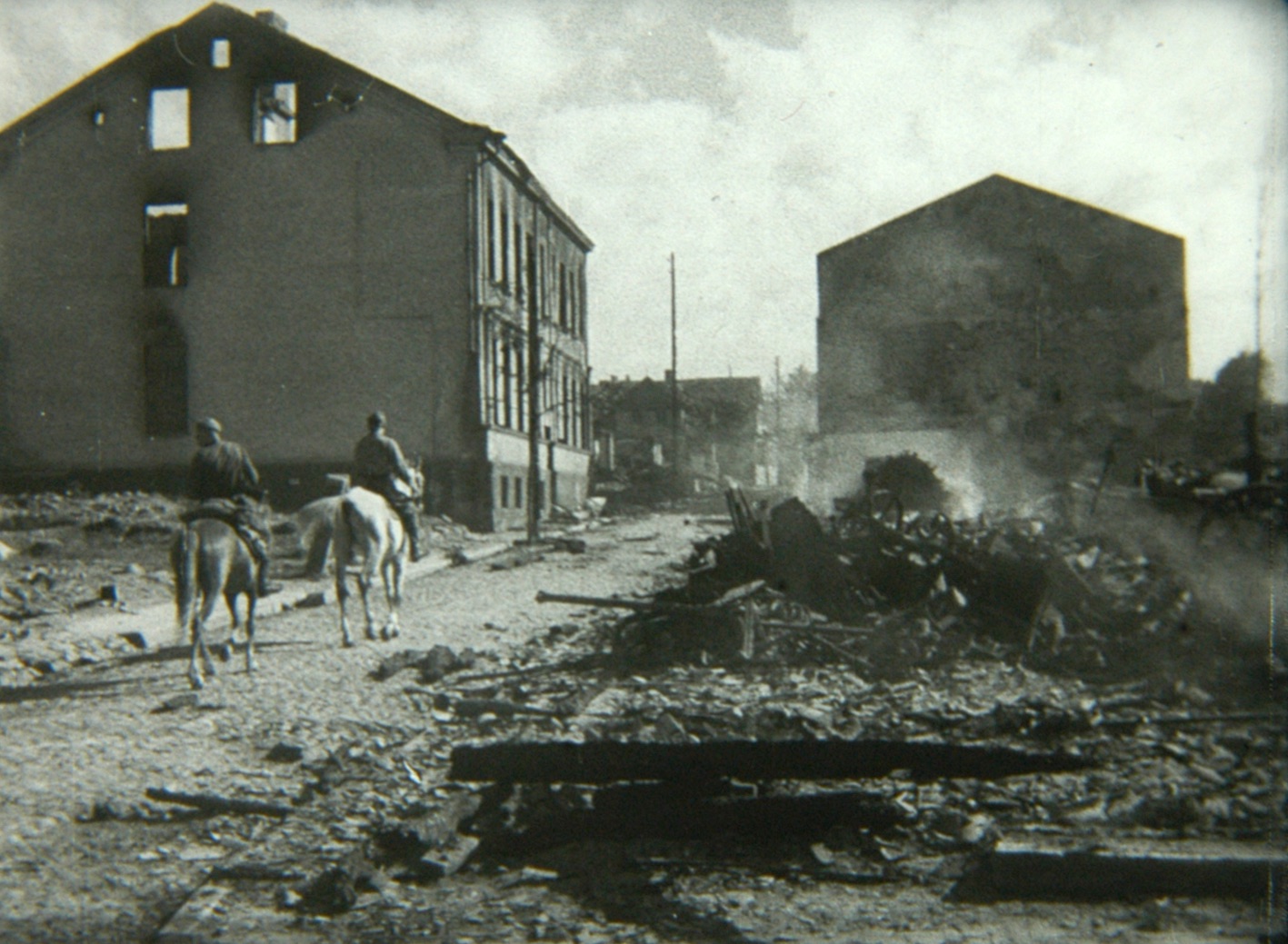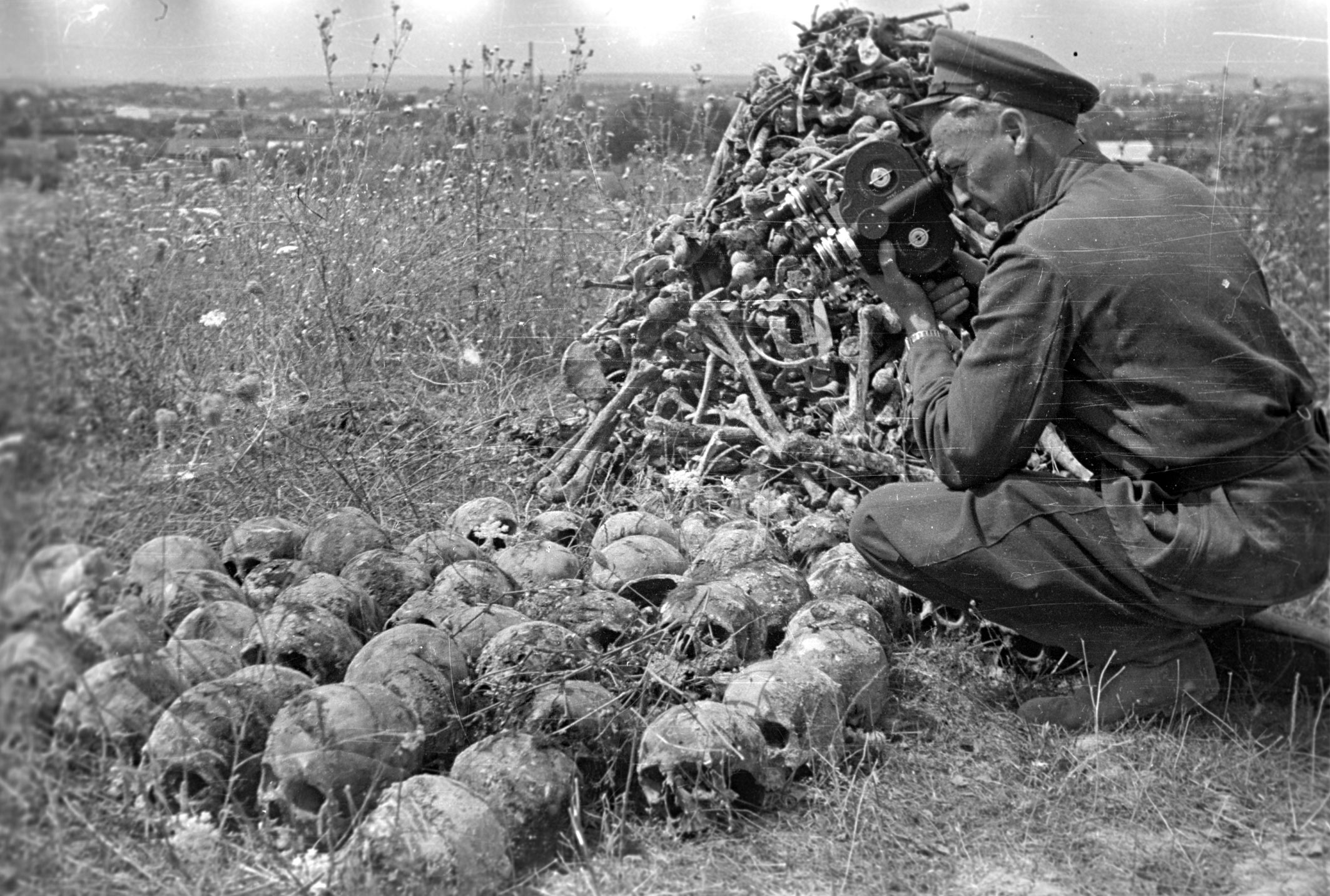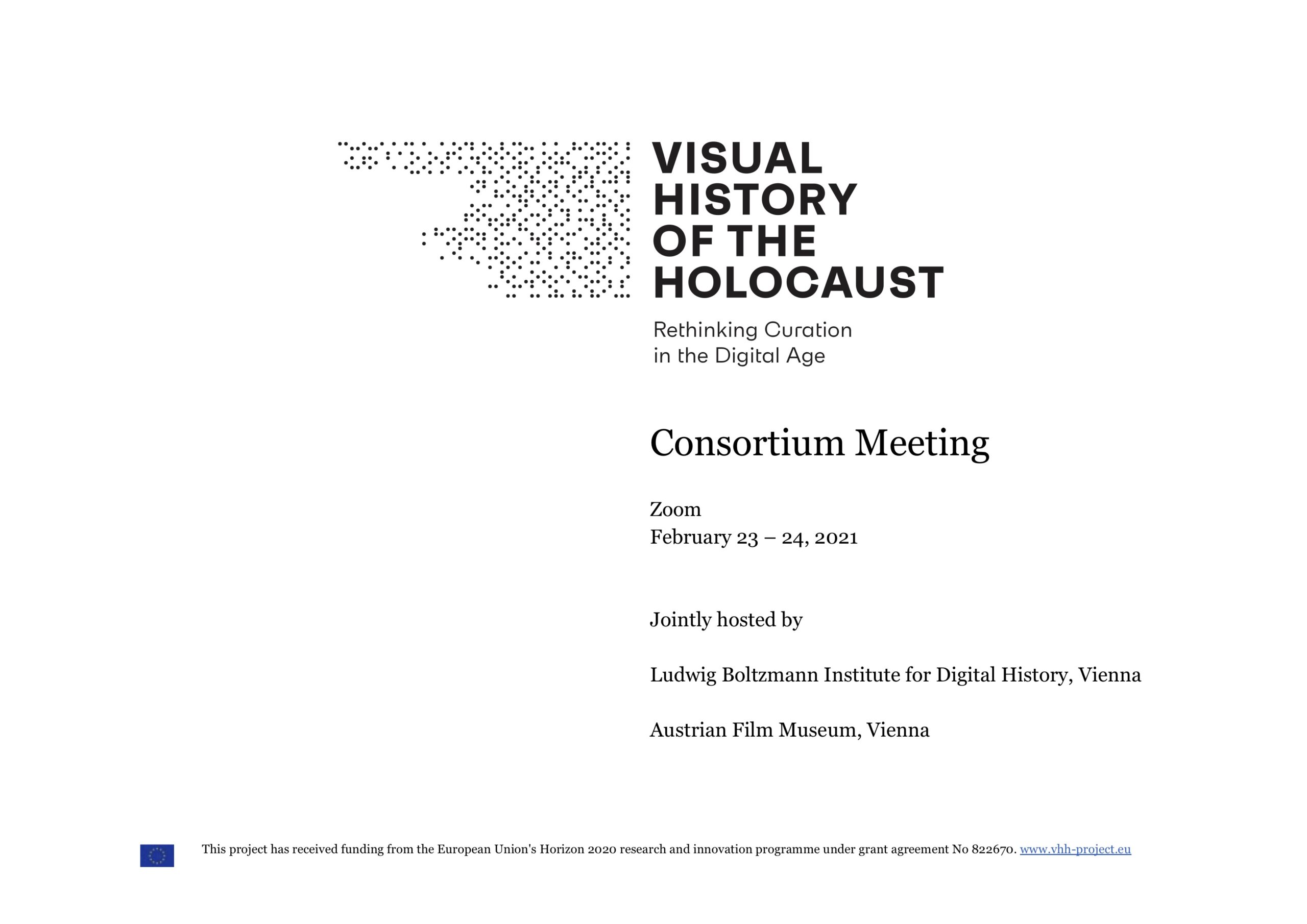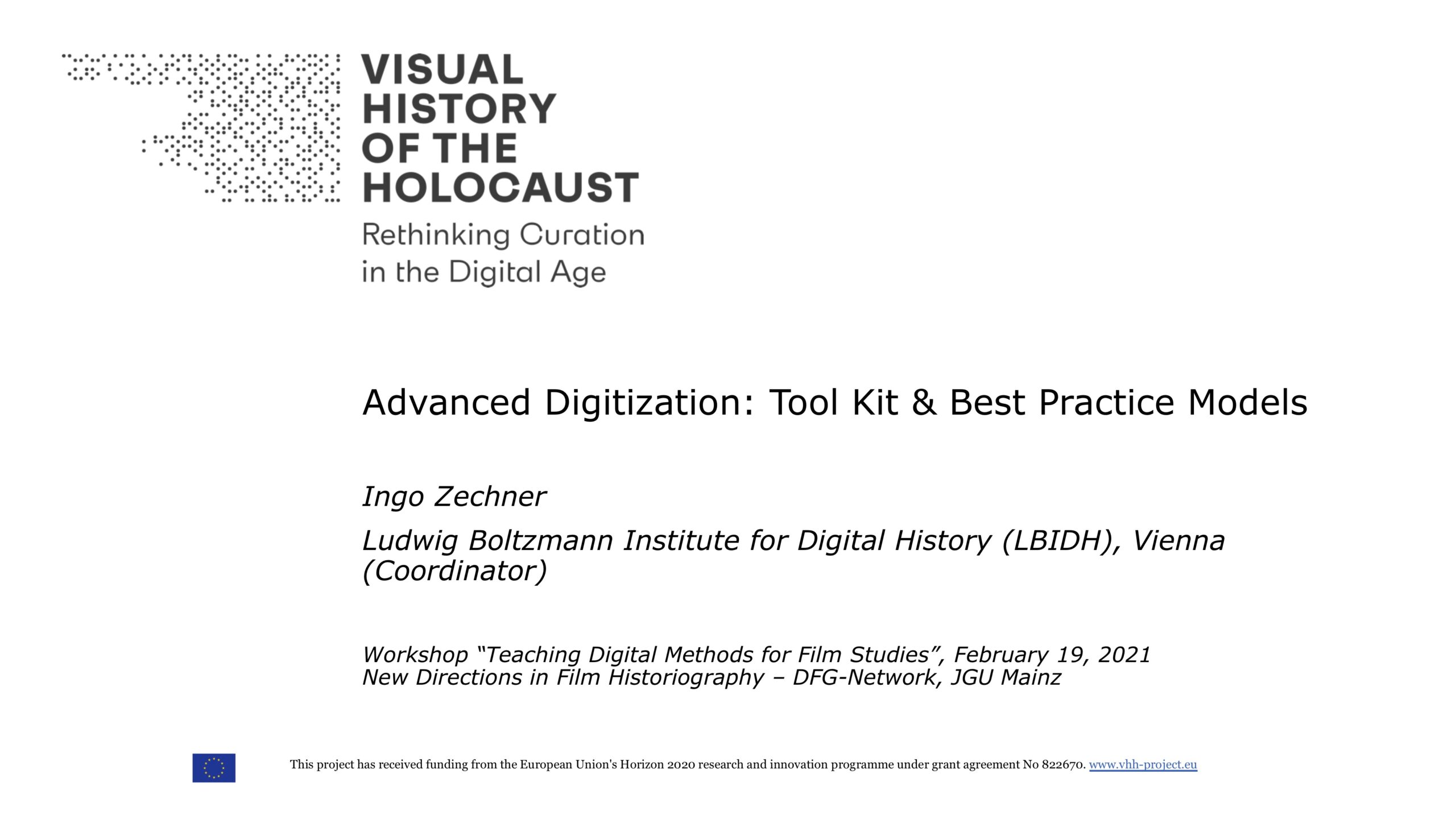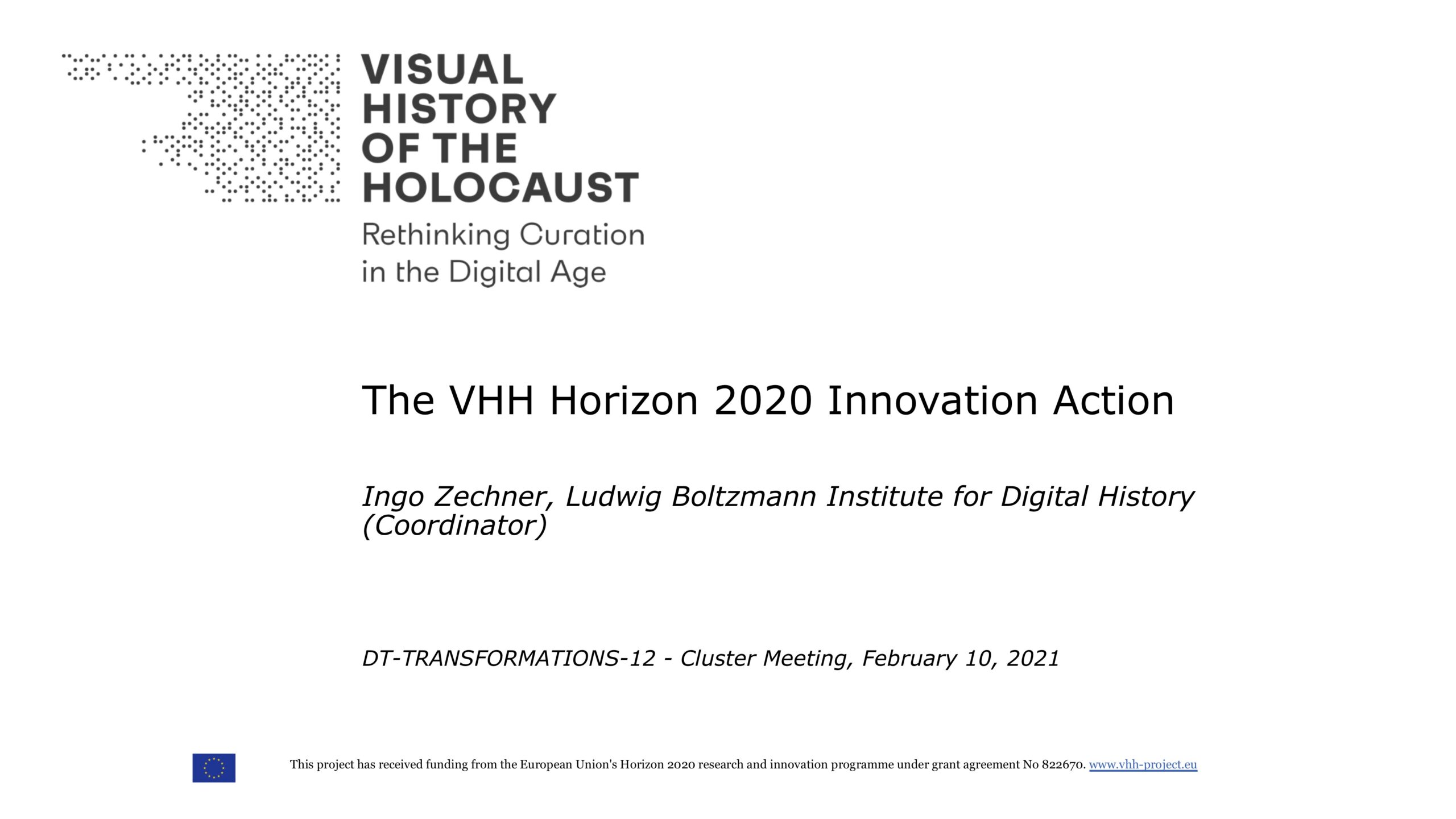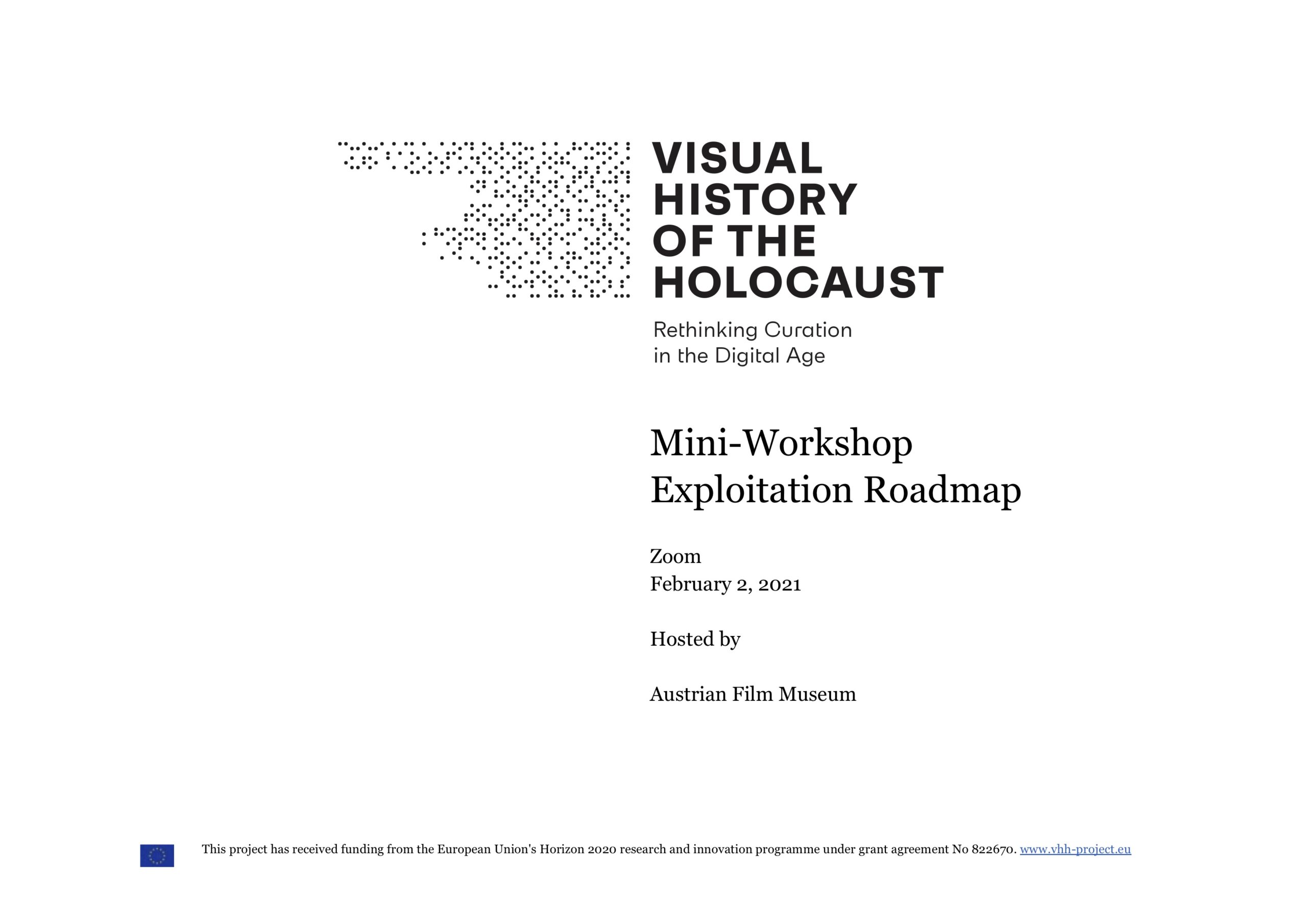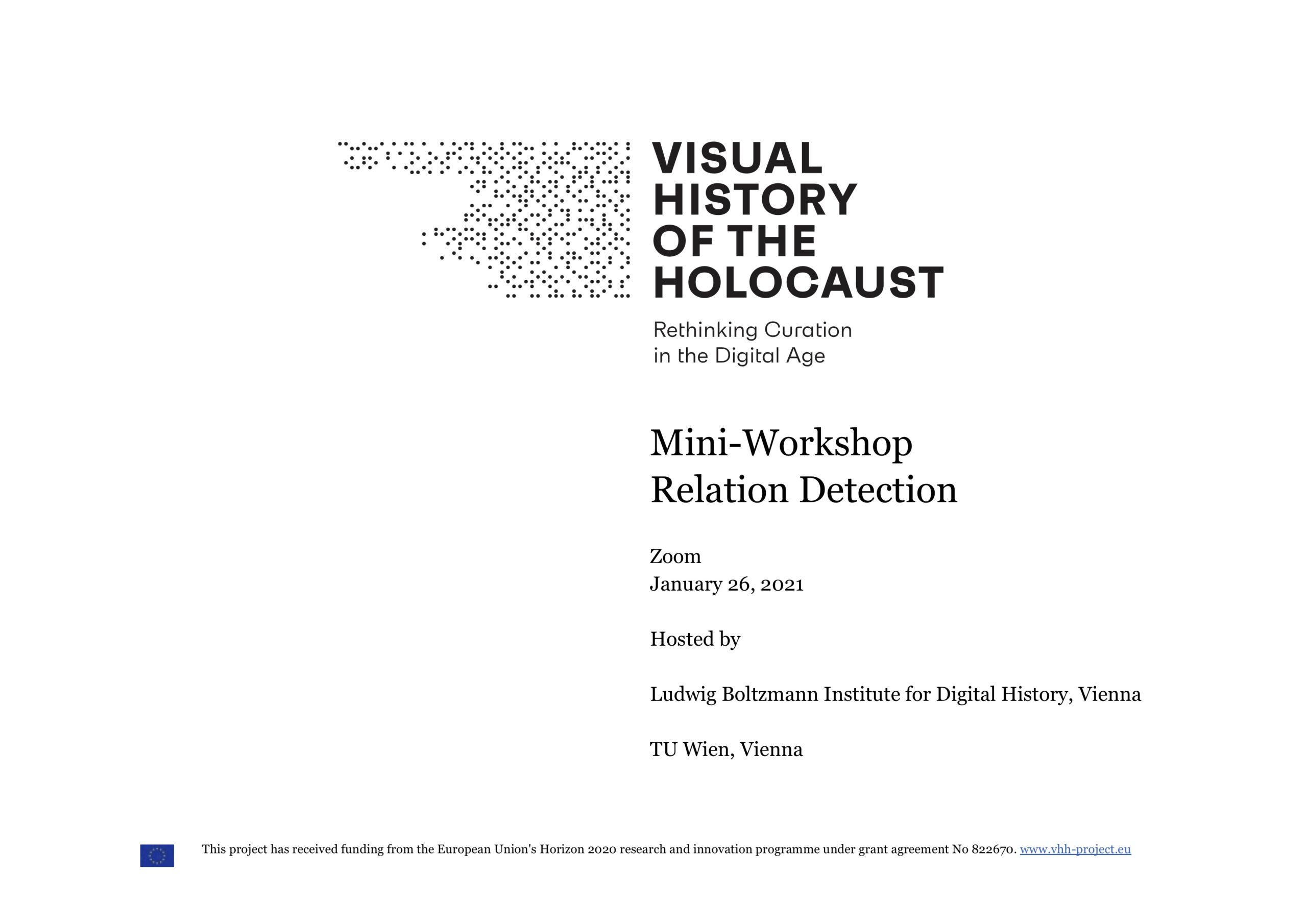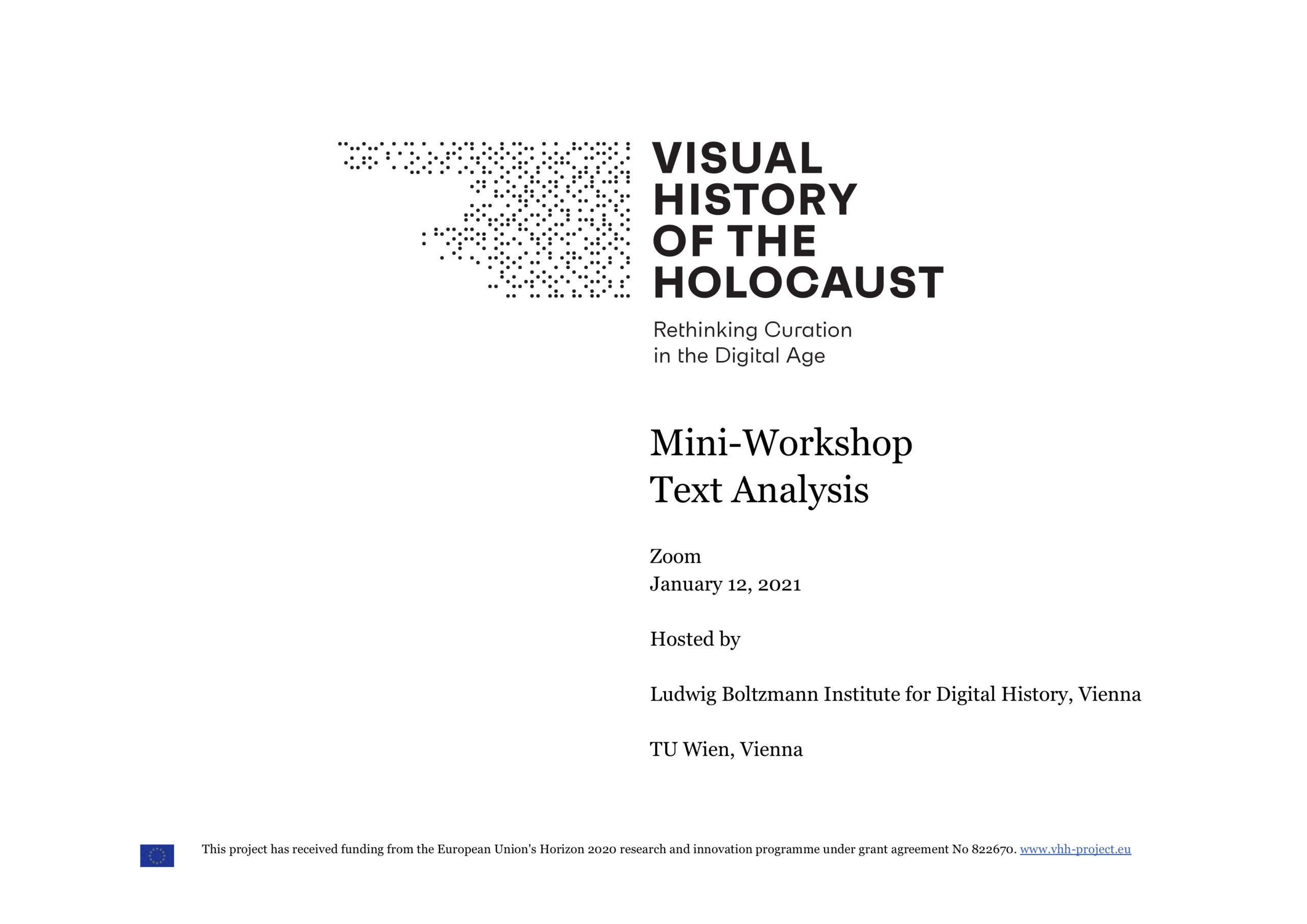Paysage dans la compréhension des crimes: pratiques de preneurs de vues soviétiques
Présentation d'Irina Tcherneva à la conférence "Quel paysage pour la mémoire? Quelle mémoire pour le paysage?"
Thursday, 16.12.2021, 11:45 to Thursday, 16.12.2021, 12:15
Paris
Cette contribution se concentre sur le paysage et la dimension spatiale dans les films documentaires et les photographies créés par les Soviétiques en 1941-1945 lors de la libération des territoires occupés par les nazis.
Visual History of the Holocaust – Projektpräsentation
Präsentation von Ingo Zechner im Rahmen des "LBG ERA Dialog"
Thursday, 25.11.2021 to Thursday, 25.11.2021
Online
VHH Research Seminar – Session 7: How to Tell the Story of Liberated Concentration Camps: On the Written Documents of British Cameramen and Filmmakers
Presentation by Ulrike Weckel
Tuesday, 23.11.2021, 16:00 to Tuesday, 23.11.2021, 18:00
Online
In the seventh session of CERCEC's H2020 "Visual History of the Holocaust" Research Seminar, Ulrike Weckel (Justus Liebig University Giessen) explores what the written documents of British cameramen and filmmakers can tell us about their perceptions of Allied atrocity films.
Expanded Places: Rethinking the Virtual Transformation of Memorials
Presentation by Tobias Ebbrecht-Hartmann at the online workshop "SPUR-lab meets Museum am Tatort"
Thursday, 18.11.2021, 10:00 to Thursday, 18.11.2021, 10:30
Online
Augmentation and virtualization can make layers of the past visible and enable a state of co-presence.
Visual History of the Holocaust – Project Presentation
Presentation by Ingo Zechner and Tobias Ebbrecht-Hartmann at the online workshop "Going Digital with Difficult Histories"
Tuesday, 16.11.2021 to Tuesday, 16.11.2021
Online
Dunkles Erbe: Digitales Kuratieren von Holocaust-Filmen
Keynote by Ingo Zechner at the conference "Zugang gestalten! Schwieriges Erbe"
Thursday, 04.11.2021, 15:30 to Thursday, 04.11.2021, 15:30
Frankfurt am Main
VHH Research Seminar – Session 6: Towards a Forensic Cinema
Presentation by Fabian Schmidt and Alexander Zöller
Tuesday, 26.10.2021, 16:00 to Tuesday, 26.10.2021, 18:00
Online
In the sixth session of CERCEC's H2020 "Visual History of the Holocaust" Research Seminar, Fabian Schmidt and Alexander Zöller (both Film University Babelsberg) speak about film practices during the Holocaust.
Not that Oldschool: The Role of Historical Images for Younger Generations
Presentation by Julia Wittorf and Sophie Stav at the online workshop "Going Digital with Difficult Histories"
Thursday, 21.10.2021, 18:15 to Thursday, 21.10.2021, 18:30
Online
Analyzing memes versus state-funded educational platforms, this study explores how today’s younger generations re-use, adapt, recreate or de-contextualize historical images as independent communicative items to reflect their different interests and identities.
Digital Digging: Video-essayistic Practices and Archival Film
Presentation by Noga Stiassny and Evelyn Kreutzer at the online workshop "Going Digital with Difficult Histories"
Thursday, 21.10.2021, 18:00 to Thursday, 21.10.2021, 18:15
Online
Using Images to Say the Unspeakable
Presentation by Tobias Ebbrecht-Hartmann and Lital Henig at the online workshop "Going Digital with Difficult Histories"
Thursday, 21.10.2021, 17:00 to Thursday, 21.10.2021, 17:20
Online
Visual History of the Holocaust – Projektpräsentation
Präsentation von Ingo Zechner am wöchentlichen Workshop des Wien Museums
Thursday, 21.10.2021 to Thursday, 21.10.2021
Online
Digital Overload: Curating Big Data
Presentation by Anna Högner and Michael Loebenstein at the online workshop "Going Digital with Difficult Histories"
Tuesday, 19.10.2021, 18:40 to Tuesday, 19.10.2021, 19:00
Online
Digital Transformation of Analog Film
Presentation by Ingo Zechner at the online workshop "Going Digital with Difficult Histories"
Tuesday, 19.10.2021, 18:00 to Tuesday, 19.10.2021, 18:20
Online
Reconsidering Representations of the Holocaust – Digital Curation, Evidence and Remembrance Through the VHH Project
Roundtable and discussion at the virtual conference "Examining American Responses to the Holocaust: Digital Possibilities"
Tuesday, 12.10.2021, 16:00 to Tuesday, 12.10.2021, 17:30
Online
Breaking new ground in the way moving image material about the Holocaust has been and could be presented in the future.
Visual Histories of 20th Century Occupation
Presentations by Michael Loebenstein, Tobias Ebbrecht-Hartmann, Noga Stiassny and Jeremy Taylor at the "Visual Histories of 20th Century Occupation" Webinar
Tuesday, 12.10.2021, 10:00 to Tuesday, 12.10.2021, 11:00
Online
The webinar is held jointly by the two ERC funded projects Cultures of Occupation in Twentieth Century Asia (COTCA) and Visual History of the Holocaust (VHH). It is funded by the Horizon Results Booster, an initiative of the European Commission.
The Visual Walkthrough Method: A Tool for the Analysis of Playful Images in the Digital Age
Presentation by Lital Henig and Shir Ventura at the Vienna-Jerusalem Graduate School 2021
Thursday, 07.10.2021, 15:45 to Thursday, 07.10.2021, 16:30
Vienna
In this presentation, Lital Henig and Shir Ventura explore how visual memory tropes of the Holocaust are used and in turn, impact the contemporary memory work of the Holocaust. They offer a conceptualization of playful images to depict their current form and function, and a new methodological framework for understanding the deep change the visual history of the Holocaust is undergoing in the digital age.
Guiding from Abroad: The Re-Emergence of In-/Visible Values in Virtual Holocaust Commemoration Guiding
Presentation by Shir Ventura and Julia Wittorf at the Vienna-Jerusalem Graduate School 2021
Thursday, 07.10.2021, 15:00 to Thursday, 07.10.2021, 15:45
Vienna
This study offers a new perspective on how to conceptualize and understand virtual guiding as a form of augmented space in re-creating a historical site that is out of reach by using digital means to produce a spatial, virtual actuality.
The Hybrid Memorial
Presentation by Tobias Ebbrecht-Hartmann at the Vienna-Jerusalem Graduate School 2021
Thursday, 07.10.2021, 14:00 to Thursday, 07.10.2021, 15:00
Vienna
Memorials are hybrid places, constituting multiple layers augmented by classical and new media technologies.
Israel's diasporic Artscapes: Between here and there
Presentation by Noga Stiassny at the Vienna-Jerusalem Graduate School 2021
Wednesday, 06.10.2021, 12:30 to Wednesday, 06.10.2021, 13:30
Vienna
Mapping Visual History of the Holocaust in the Digital Age: Approaching Holocaust Memory through Digitized Moving Images in the Visual History of the Holocaust and the Ephemeral Films Projects
Presentation by Tobias Ebbrecht-Hartmann and Michael Loebenstein at the online-conference “Digital Memory – Digital History – Digital Mapping: Transformations of Memory Cultures and Holocaust Education”
Friday, 24.09.2021, 11:30 to Friday, 24.09.2021, 13:30
Online
The presentation introduces two online infrastructures that offer advanced search functions and online tools for viewing, reviewing, annotating and connecting moving images from the era of National Socialism and the Holocaust.
Relational Memories
Panel with members of the VHH project at the Fifth Annual Conference of the Memory Studies Association on “Convergences” in Warsaw
Friday, 09.07.2021, 10:00 to Friday, 09.07.2021, 12:00
Online
As visual media play an important role in shaping memory, we are rethinking the role of visual materials in the formation and transformation of memory from a perspective that views relations as a fundamental principle incorporating historical contexts, specific events, and particular places.
VHH Research Seminar – Session 5: Soviet Filmed Atrocity Images on American Movie Screens, 1942–1945, and Some Partial Answers to the Questions of What, When, Where and By Whom?
Presentation by Stuart Liebman
Tuesday, 15.06.2021, 18:00 to Tuesday, 15.06.2021, 20:00
Online
In the fifth session of CERCEC's H2020 "Visual History of the Holocaust" Research Seminar, Prof. em. Stuart Liebman (Queens College, City University of New York) speaks about Soviet atrocity images shown in American cinemas during World War II.
Braquer l’objectif sur les massacres. Registres visuels dans l’image fixe et animée des traces de crimes nazis (1941–1945)
Présentation d'Irina Tcherneva dans le cadre d'un séminaire du programme de recherche "Samson (Sciences, Arts, Medicine and Social Norms)"
Friday, 11.06.2021, 16:00 to Friday, 11.06.2021, 18:00
Paris
Au cours de la libération des territoires occupés par la Wermacht, les praticiens soviétiques du cinéma et de la photographie documentaires ont créé un considérable corpus visuel, peu connu jusqu’à son exploitation par deux récents projets de recherche : l’ANR « Cinésov, 1939-1949» et Horizons2020 « Visual History of the Holocaust ».
Migrating Images of the Holocaust in the Digital Age: New Methods of Digital Curation
Presentation by Lital Henig and Shir Ventura at the online-conference “Digital Holocaust Memory from the Margins: Practices, Places, and Narratives”
Thursday, 03.06.2021, 15:00 to Thursday, 03.06.2021, 17:30
Online
From online archives to video games, Holocaust related imagery has migrated to digital media. This migration also impacts practices of digital curation, as the digitised images of the Holocaust behave differently than analogue ones.
Teaching with Digital Exhibitions: The Gas Chamber and the VHH-MMSI
Presentation by Noga Stiassny at the online-conference “Digital Holocaust Memory from the Margins: Practices, Places, and Narratives”
Thursday, 03.06.2021, 15:00 to Thursday, 03.06.2021, 17:30
Online
This paper focuses on artistic representations of the Nazi gas chambers and demonstrates how this icon of Holocaust memory can be used as the thematic and visual skeleton of a digital exhibition.
Video Analysis in Large Historical Film Collections
Presentation by Daniel Helm as part of the lecture series on "Video Analysis", hosted by the Computer Vision Lab of TU Wien
Monday, 31.05.2021, 15:00 to Monday, 31.05.2021, 17:00
Online
Haunting Images: A Digital Approach to the Visual History of the Holocaust
Presentation by Ingo Zechner at the international workshop "Negotiating Troubled Pasts: History, Politics, Arts and the Media"
Friday, 28.05.2021, 10:30 to Friday, 28.05.2021, 10:50
Online
VHH Research Seminar – Session 4: Un-Seen: The Manyfold Lives of a 1943 Deportation Film Footage across the East-West Divide
Presentation by Nadège Ragaru
Tuesday, 18.05.2021, 16:00 to Tuesday, 18.05.2021, 18:00
Zoom
In the fourth session of CERCEC's H2020 "Visual History of the Holocaust" Research Seminar, Prof. Nadège Ragaru (Sciences Po, Paris) speaks about the life and afterlife of film footage documenting the deportation of Jews in 1943.
Migrating Images in the Digital Age: Multimodal Curation of Visual Records from the Liberation of Nazi Concentration Camps in Digital Infrastructures
Presentation by Tobias Ebbrecht-Hartmann, Lital Henig, Noga Stiassny and Fabian Schmidt at the online-conference “Migrating Archives of Reality”
Thursday, 06.05.2021, 14:00 to Thursday, 06.05.2021, 15:00
Zoom
Digital media and new forms of visual appropriation by digital means intensified the constant circulation of photographs and film footage related to historical events. Next to “classical” media such as films, paintings and graphic novels, nowadays also digital short videos or Internet memes refer to historical imagery. As migrating images, the visual records from the liberation of Nazi concentration camps inform complex and multilayered chains of references.
Historicisation des prises de vue: filmages de crimes nazis par les opérateurs soviétiques
Présentation de Valérie Pozner et Irina Tcherneva dans le cadre du workshop "Cultures visuelles, histoire croisée du regard soviétique"
Tuesday, 13.04.2021 to Tuesday, 13.04.2021
Paris
Cette présentation porte sur la nature du projet Horizons2020 « Visual History of the Holocaust », son ampleur et les vecteurs selon lesquels il se décline. Nous présentons un corpus considérablement élargi, les documents récemment recueillis et nos manières de les articuler, pour soulever ensuite de nouvelles interrogations sur les archives visuelles et textuelles.
Unfolding the Visual History of the Holocaust through American Liberation Footage
Presentation by Ingo Zechner, Lindsay Zarwell and Criss Austin at the online-conference "Films of State: Moving Images Made by Governments"
Thursday, 08.04.2021, 13:00 to Thursday, 08.04.2021, 14:30
Zoom
With a focus on color film footage shot by the U.S. Ary Air Forces at Buchenwald concentration camp, this presentation provides an overview of how the use and reuse of government films is explored in the VHH project.
VHH Research Seminar – Session 3: Soviet Footage on Nazi Crimes and Its Textual Documentation: Identification and Research Issues
Presentation by Valérie Pozner and Irina Tcherneva
Tuesday, 06.04.2021, 16:00 to Tuesday, 06.04.2021, 18:00
Zoom
In the third session of CERCEC's H2020 "Visual History of the Holocaust" Research Seminar, Valérie Pozner (CNRS-THALIM) and Irina Tcherneva (CNRS-Eur'ORBEM) speak about Soviet film footage documenting Nazi crimes.
VHH Research Seminar – Session 2: Dziga Vertov’s Blood for Blood (1941) in the Interval of Fall 1941
Presentation by John MacKay
Friday, 26.03.2021, 16:00 to Friday, 26.03.2021, 18:00
Zoom
In the second session of CERCEC's H2020 "Visual History of the Holocaust" Research Seminar, John MacKay (Yale University, Film and Media Studies/Slavic Languages and Literatures) speaks about Vertov's Blood for Blood (1941).
Histoire du cinéma letton
Présentation d'Irina Tcherneva dans le cadre du séminaire de l'INALCO
Monday, 08.03.2021 to Monday, 08.03.2021
Paris
Cette contribution a porté sur la constitution de la filière cinématographique en Lettonie, annexée à deux reprises à l'Union soviétique et occupée par les forces nazies. Le filmage des crimes de guerre, puis le tournage des films de procès des criminels de guerre constituent une pièce cruciale de cette histoire.
VHH Research Seminar – Session 1: The Making of Majdanek – Cemetery of Europe (1944)
Presentation by Natascha Drubek-Meyer
Thursday, 25.02.2021, 16:00 to Thursday, 25.02.2021, 18:00
Zoom
In the first session of CERCEC's H2020 "Visual History of the Holocaust" Research Seminar, Natascha Drubek-Meyer (Free University of Berlin/ Fonte Stiftung, Peter Szondi-Institut Berlin) speaks about Majdanek.
Consortium Meeting
Annual VHH Consortium Meeting
Tuesday, 23.02.2021, 15:00 to Wednesday, 24.02.2021, 19:00
Zoom
At the beginning of the second half of the VHH project, this large Consortium Meeting provides a multi-perspective update on where we stand and where we go.
Advanced Digitization: Tool Kit & Best Practice Models
Presentation by Ingo Zechner at the online workshop “Teaching Digital Methods for Film Studies”, JGU Mainz
Friday, 19.02.2021, 11:00 to Friday, 19.02.2021, 12:00
Zoom
What is advanced about Advanced Digitization? In this presentation, Ingo Zechner advocates for a comprehensive understanding of Advanced Digitization.
The VHH Horizon 2020 Innovation Action
Project presentation by Ingo Zechner at the online cluster meeting of the projects funded under the DT-TRANSFORMATIONS-12-2018-2020 topic, EU Commission, REA
Wednesday, 10.02.2021, 10:00 to Wednesday, 10.02.2021, 12:00
Zoom
The topic comprises a group of six projects that have officially kicked-off. The objective of this first cluster meeting and its brief project presentations is to allow projects to get to know and learn from each other, to exchange, to share and start planning actions in synergy.
Répressions de 1941 et retournement des images migrantes
Présentation d'Irina Tcherneva à la conférence "Lituanie et Lettonie, d'une occupation à l'autre"
Thursday, 04.02.2021, 19:30 to Thursday, 04.02.2021, 21:30
Paris
Exploitation Roadmap
Mini-Workshop
Tuesday, 02.02.2021, 09:30 to Tuesday, 02.02.2021, 13:00
Zoom
The aim of this internal mini-workshop is to further refine the VHH Results and Stakeholders Matrix, and to workshop the VHH project’s strategic approach to exploitation in preparation for the consortium meeting 2021 and upcoming deliverables.
Relation Detection
Mini-Workshop
Tuesday, 26.01.2021, 14:00 to Tuesday, 26.01.2021, 17:00
Zoom
Exploring the possibilities and challenges of automatic relation detection in films is the aim of this mini-workshop.
Text Analysis
Mini-Workshop
Tuesday, 12.01.2021, 09:30 to Tuesday, 12.01.2021, 13:00
Zoom
At the beginning of the second half of the VHH project, this joint mini-workshop gathers computer scientists, historians and media scholars to present and discuss the possibilities and further requirements of two software solutions employing automatic analysis tools developed in the course of the project: BOW (Batch OCR Webservice) and ArchAIvist.
